The Home Front is an ongoing series where we highlight the mission and ministry taking place around our territory. We will visit each Canadian province and territory, as well as Bermuda, and celebrate the innovation and impact the Army is having in corps, social services and youth ministry.
TEEN GROUP IN MONCTON, N.B
Dan Cooper has worked in youth ministry in every city he’s lived in—from Hartland, N.B., to Moncton, N.B., to Lynchburg, Virginia, to Hamilton, Ont., and back to Moncton. And in every city, he has taught the teens a game he learned from his youth pastor: Aliens.
“It’s a little bit of hide and seek, a little bit of tag, a little bit of manhunt, all combined together,” he says. “Lots of running around scared in the dark. It’s always a hit.”
These days, they play it at Moncton Citadel Community Church, where he leads the teen group along with his wife, Jalianne Li. The group meets on Sunday evenings about twice a month for a Bible study, games and prayer. For the past couple of years, they have been slowly reading through 1 and 2 Samuel, books that Cooper has taught in his academic career as an Old Testament professor.
“I get to wear two hats at the same time,” he says. “There’s the professor hat, but then I also still get to wear the youth pastor hat. I really love these teens. So, I try to blend the academic with, how is this passage applicable to their lives? This is an ancient text, but David was a young guy, dealing with young guy struggles. Even though our technology and culture are different, humanity is the same.”
About two-thirds of the group are from families who are new to Canada. For many, English is a second, third or even fourth language. During prayer time, they share their struggles with school and friends and worries about their immigration status.
“They’re keenly aware of the precarity of their situations,” says Cooper. “They want to stay here. We’ve prayed and prayed with them through the ups and downs of the immigration process. And when they say, ‘Hey, my dad got a job,’ or ‘We moved on to the next step,’ we get to celebrate with them.”
Cooper has been through many of his own struggles over the years, and says the faithful concern, care and love shown by Christ’s followers is what sustained him during times of pain and doubt.
“If I can be that kind of consistent source of love and encouragement, someone these teens can turn to for questions, for help,” he says, “if I can be half the mentor that some of my mentors have been to me—it’s worth it.”
HOPE CAFÉ IN SAINT JOHN, N.B.
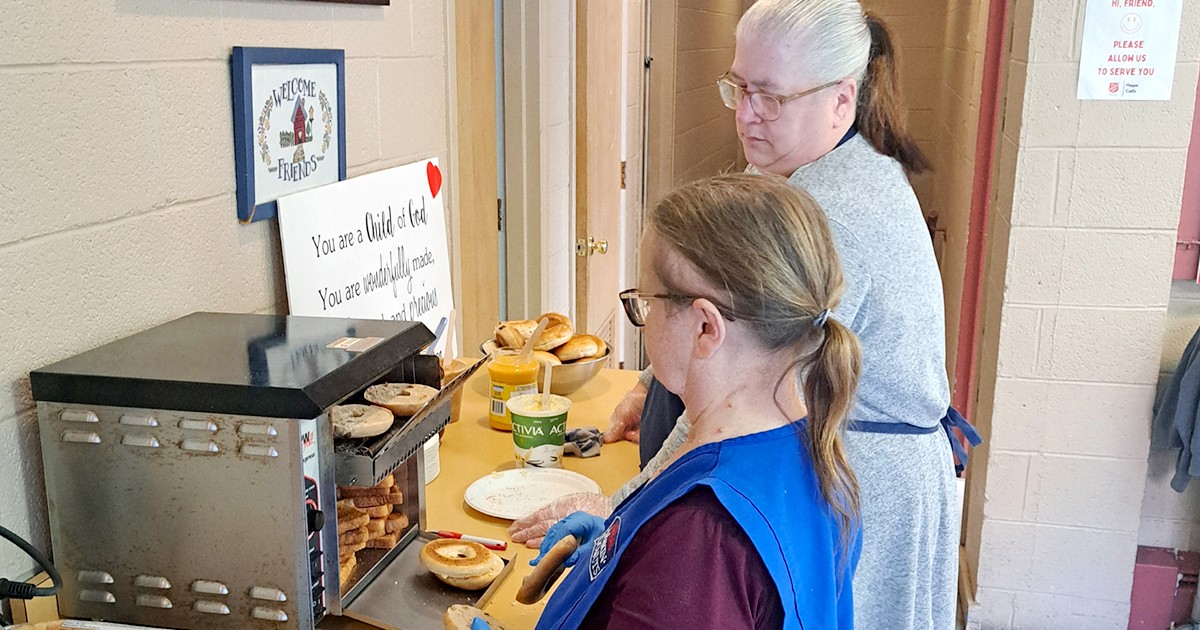
(Photos: Lieutenant Jason Brinson)
In Saint John, N.B., a long-running breakfast program at Saint John Hope Community Church is a warm, inviting environment for 50-70 people every Monday, Wednesday and Friday. Breakfast is served restaurant-style, with volunteers taking orders at each table. Who is Hope Café for?
“Whoever wants to come in,” says Mary Doiron, community and family services coordinator. “We have people who are homeless. We have people who live by themselves. We have seniors. And we have some who just like the camaraderie of it all.”
There’s usually a game of cribbage going—when she’s not busy, Doiron often joins in. Others use the computers to check their email or look for an apartment. Some tuck their belongings under a table and catch up on rest.
“The shelters close first thing in the morning,” says Doiron. “People come here for breakfast and to get out of the elements, but they also know they can sleep if they need to, if the noise at the shelter kept them up all night. They feel safe here.”
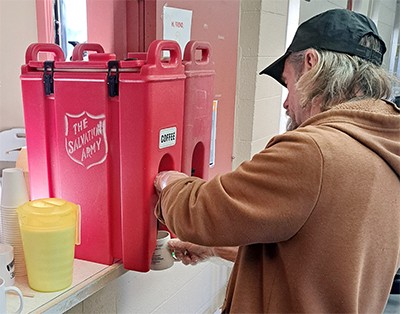 As well as a hot meal, guests come to Doiron for help with other things, such as clothes or drafting a resumé. “And sometimes they just need someone to listen,” she says. “It leads to inviting them to church or to other programs that The Salvation Army has to offer.”
As well as a hot meal, guests come to Doiron for help with other things, such as clothes or drafting a resumé. “And sometimes they just need someone to listen,” she says. “It leads to inviting them to church or to other programs that The Salvation Army has to offer.”
Building relationships and trust opens the door to helping people move forward.
“A meal like this is important, because it’s a step—and one step leads to more steps. We serve because we love people, and that’s what Jesus did. We follow in his footsteps.”
Doiron’s own experience helps her relate to the struggles people face.
“I lived the story that these clients live,” she says. “Some of the stuff I went through in life—I wouldn’t be here if it wasn’t for God. And I think the reason is to be right here where I am now, to help others. I believe that’s the story God had for me.”
PATHWAY OF HOPE IN SUSSEX, N.B.
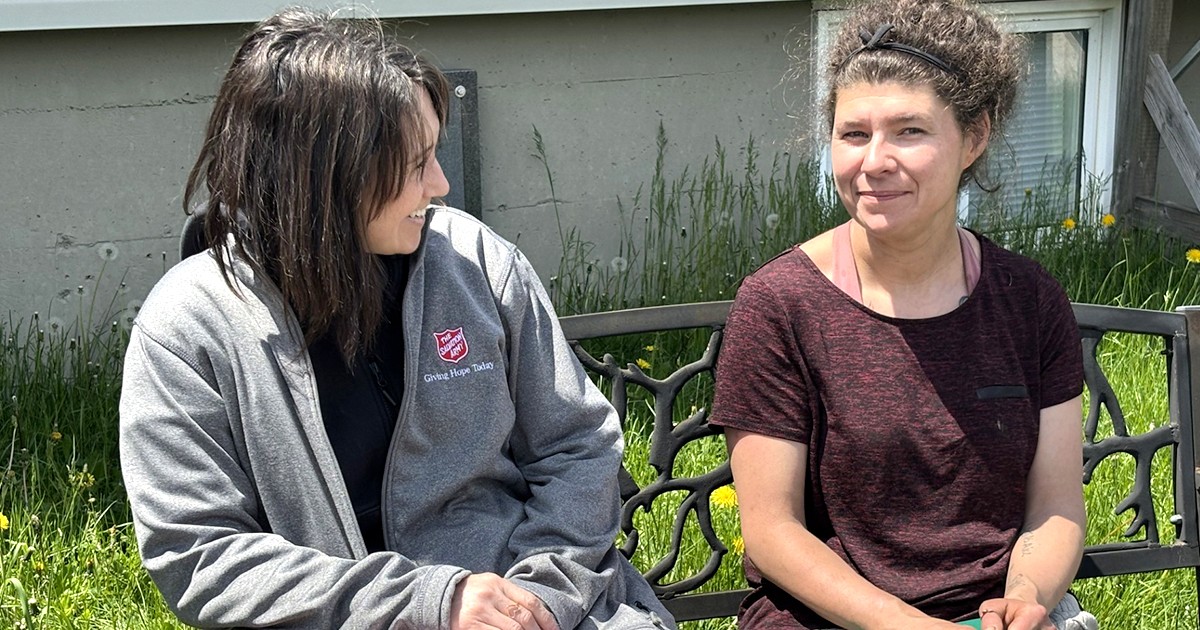
(Photo: Shelly McCready)
Last year, more than three million visits were made to The Salvation Army in Canada and Bermuda, often for help with basic needs, such as food, clothing and shelter. In times of crisis, the Army meets people where they are with love and support. But how can we help people move from crisis to stability? How can we move beyond serving to solving?
“Pathway of Hope represents a philosophical and cultural shift in our practice of providing service and support,” says Claire Dunmore, territorial community mission secretary. “It helps people break the cycle of poverty by addressing root causes rather than treating symptoms. It’s an approach that focuses on their strengths to overcome barriers—building hope for the future.”
This approach is transforming lives in Sussex, N.B., where it starts with an assessment on readiness for change.
“You can’t do things for people and expect change—they have to want the change for themselves,” says Megan Miner, Pathway of Hope caseworker. “They have to put in the work.”
When people are ready, Miner helps them develop a plan and set achievable goals, whether that’s finishing high school, finding a job or housing, or learning to budget. She meets with participants weekly to offer encouragement and support, as well as links to other community resources. The support team also includes a spiritual care representative, recognizing the important connection between spirituality and hope.
For one woman, who was living in a tent when Miner met her, Pathway of Hope has given her the foundation she needed to change her life. At first, she didn’t make a lot of eye contact. But over time, she has grown comfortable enough to laugh and joke with Miner over coffee. She is part of a work program and makes all her shifts even though she needs to walk to work—and it’s not a short walk.
“This is her time to shine,” says Miner. “She’s a real gogetter. Things don’t always come easily, but she makes it happen. Sometimes you just need to have one person on your side, somebody rooting for you, because not everyone has that. And once she had somebody on her side—she’s destined for big things.”
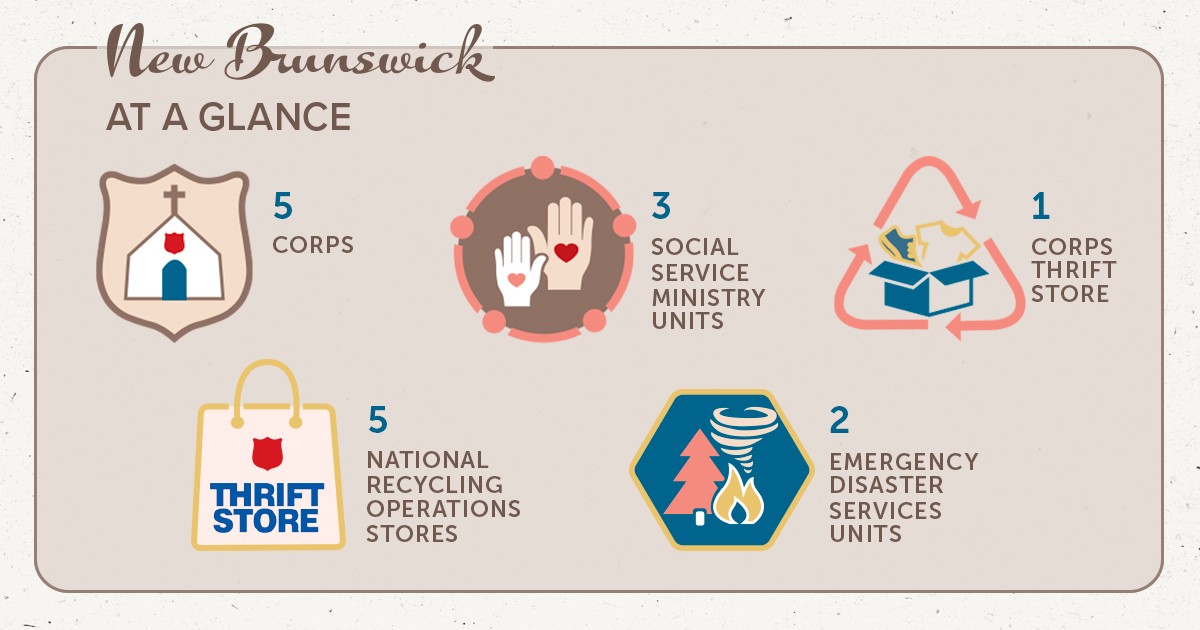
New Brunswick
At A Glance
LT-COLONEL SCOTT RIDEOUT
Divisional commander
LT-COLONEL MICHELLE RIDEOUT
Divisional officer personnel secretary and divisional secretary for spiritual life development
5 Corps
3 Social Service Ministry Units
1 Corps Thrift Store
5 National Recycling Operations Stores
2 Emergency Disaster Services Units
This story is from:




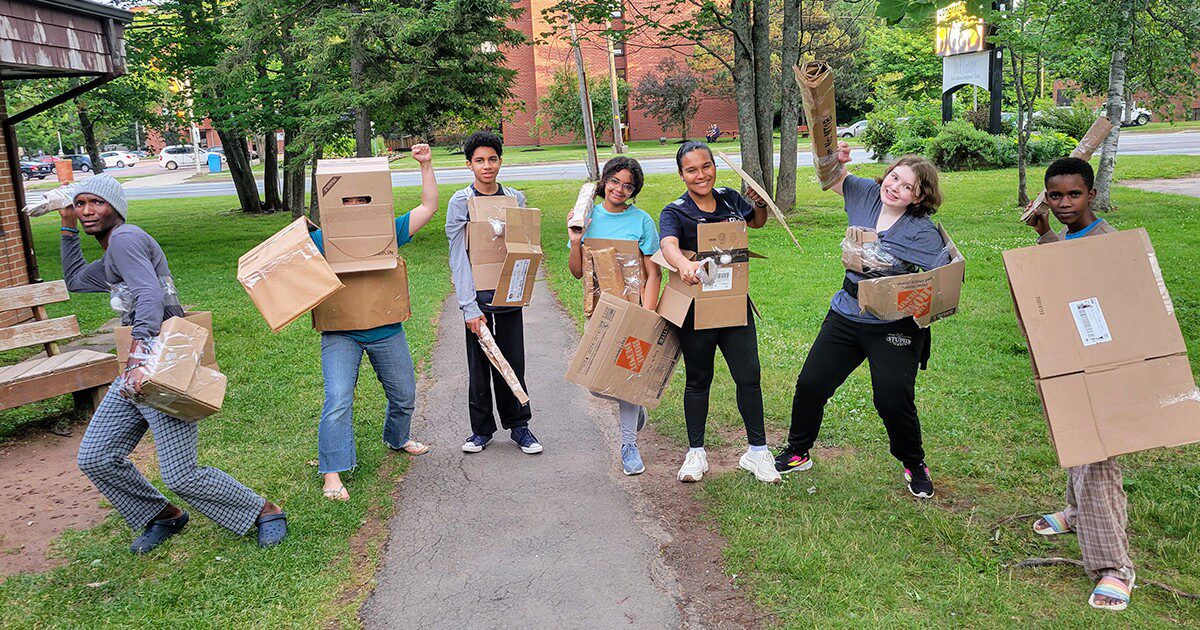





Leave a Comment